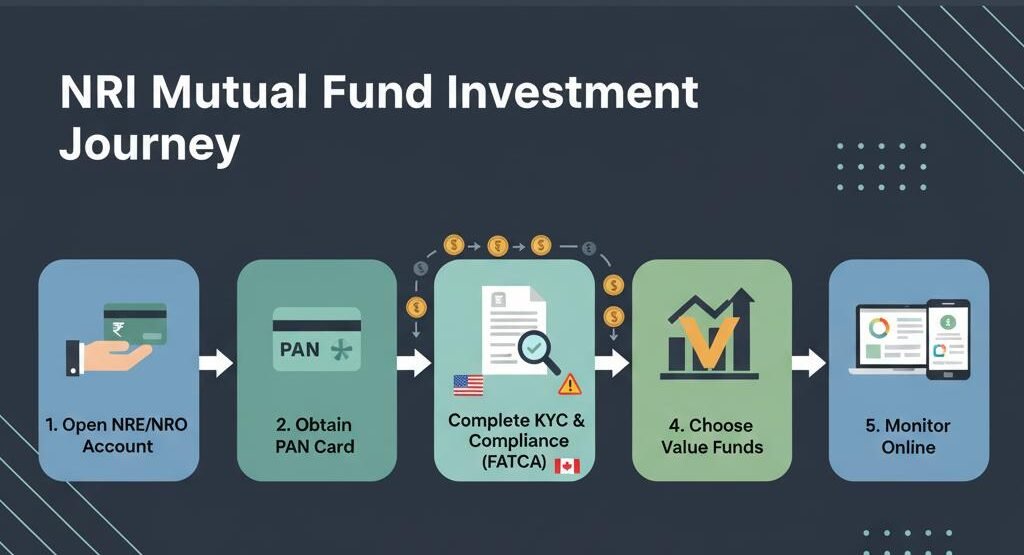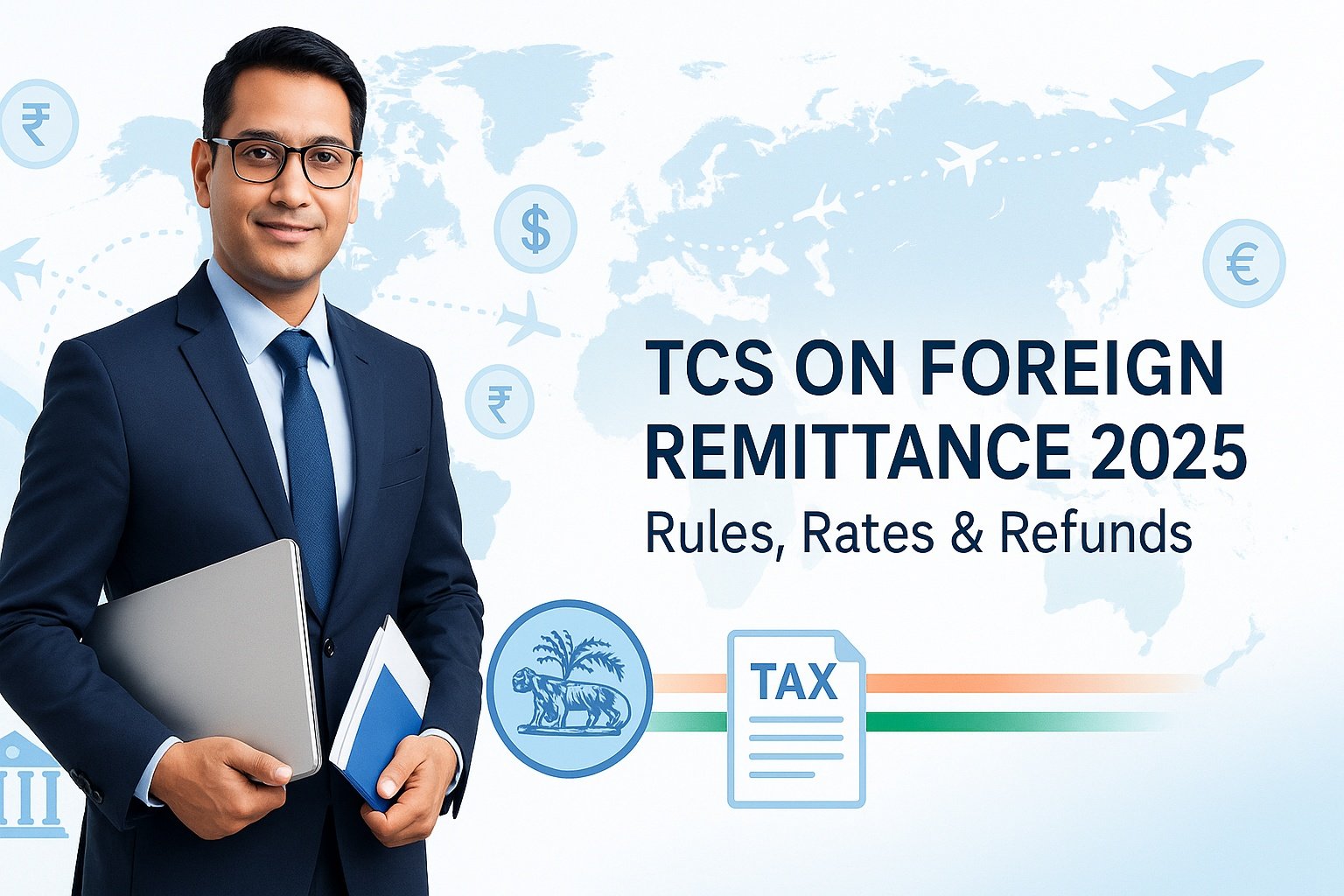Non-Resident Indians (NRIs) wanting to capitalize on India’s rapid economic growth typically turn to mutual funds as a safe way of wealth accumulation and diversification in the portfolio. With the country aiming to become a USD 5 trillion economy, the investments enable NRIs to join this rapid growth without the fine points of direct stock selection. Value funds, in particular, stand out by investing in underpriced stocks with good fundamentals, providing a combination of stability and long-term potential upside. Such an approach has built-in downside protection during periods of market downturns, thus making it ideal for remote investors.
This guide demystifies the process for NRIs in 2025, such as eligibility criteria, why to invest, setup process, fund varieties, and a detailed analysis of value funds. It also addresses updated taxation rules, key benefits, strategic suggestions, and FAQs. Though mutual funds provide an easy entry through professional advice and internet facilities, NRIs need to handle banking requirements, compliance like FATCA for residents of US/Canada, tax treaties to achieve the best returns. Always remember that there is market risk involved in investments, and it is essential to find a cross-border financial advisor for personalized advice.
Who Qualifies as an NRI Investor?
As per India’s Income Tax Act of 1961, a person’s NRI status during a financial year is based on the time spent in India, irrespective of citizenship. You are deemed an NRI if you fail to meet either of these tests of residency: residing in India for 182 days or more in such year or being in India for 60 days or more during the year and 365 days or more during the previous four years. If both conditions are not met, NRI status is applicable for taxation purposes in that year. This definition is used to define how investment income, for example, from mutual funds, is taxed and reported.

Why NRIs Invest in Indian Mutual Funds
NRIs are attracted to Indian mutual funds for their capacity to be part of the country’s economic growth while benefitting from structured returns. These are diversifying risks across various assets and industries, leveraging experienced managers to make decisions, and gaining access to high-growth opportunities from India’s growth. Online platforms facilitate easy investment and tracking from abroad. They offer a secure equity entry for value-oriented strategies, as opposed to boom-or-bust growth possibilities, which are attractive for people making a return to India or global balanced diversification.
Getting Started: Steps to Begin Investing
To initiate NRI investments in mutual funds, take the following major steps:
- Set Up an NRI Bank Account: Choose an NRE account when investing overseas income for complete repatriability and tax-free interest, or an NRO account to manage domestic income with yearly repatriation limits up to USD 1 million and tax-deductible interest. NRE is more convenient for ease of fund transfers.
- Obtain a PAN Card: This is compulsory for all monetary transactions in India and can be applied for online.
- Fulfill KYC Requirements: Submit your PAN, copy of passport, foreign address proof, and cancelled cheque from your NRI account. Most providers now offer online verification for ease.
US and Canadian residents should check AMC acceptance because of FATCA regulations, which may require additional paperwork or in-person processes.
Types of Mutual Funds for NRIs
NRIs enjoy a wide range of mutual funds in India, just like residents, with guidelines of FEMA. These include:
- Equity Fundsnvest mainly in shares, like large-cap, mid-cap, small-cap, or sectoral funds on themes like technology or healthcare. Value funds belong here, with a focus on under-valued stocks.
- Debt Funds: Invest in fixed-income instruments like bonds and treasury bills for regular returns with less risk.
- Hybrid Funds: Mix equity and debt for balanced growth and stability, aggressive, conservative, or balanced types.
- Other Categories: Index funds that follow market benchmarks, flexi-cap funds with flexible cap, and international funds for international exposure.
However, FATCA restricts US and Canada-resident NRIs, and options are narrowed down to select AMCs such as Aditya Birla Sun Life, SBI, and ICICI Prudential. SEBI regulations must be followed for all investments, and sectoral or sector funds can be appropriate for certain objectives.

What Are Value Funds?
Value funds are a type of equity mutual funds investing in stocks trading at lower than their estimated true value. Their managers analyze measures such as financial strength, operating effectiveness, relative market position, and management to identify temporarily bargain-priced opportunities due to market oversights or temporary setbacks. Such stocks tend to have relatively modest price-to-earnings, book value, or cash flow ratio relative to benchmarks. They prefer established companies with good track records, most of which distribute dividends for added income. Value funds market corrections recognize the real worth, presenting a disciplined, patient strategy for equity investing.
Taxation Rules for NRIs
Taxation for NRIs on mutual funds mirrors resident rules but includes TDS deductions. For equity-oriented funds (over 65% in equities, like value funds): Short-term capital gains (STCG, under 12 months) are taxed at 20%, with TDS at 20%. Long-term capital gains (LTCG, over 12 months) face 12.5% tax on amounts above ₹1.25 lakh annually, with TDS at 12.5%. Debt funds are now taxed at slab rates as STCG regardless of holding period, with TDS up to 30% on redemptions from April 2025. Hybrid funds follow classifications based on equity exposure.
Dividends are taxed at slab rates if exceeding ₹5,000 yearly, with 20% TDS. DTAA with over 90 countries allows claiming lower rates or credits via a Tax Residency Certificate. US/Canada NRIs must adhere to FATCA reporting.
Benefits of Value Funds for NRIs
Value funds suit NRIs by providing:
- Downside Cushion: Investment in undervalued stocks offers a margin of safety at times of corrections.
- Reduced Fluctuations: Concentration on established businesses results in lower volatility compared to growth schemes.
- Strong Historical Performance: For longer time frames, these methods tend to give better returns since prices catch up with fundamentals.
- Sector Spread: Positions in different segments such as banking and essentials reduce risks on individual sectors.
- Currency and Timing Advantages: SIPs counterbalance rupee volatility and prevent unfavorable entry points.
They bridge the gap between conservative fixed-income options and aggressive equities, supporting long-term goals like retirement or repatriation.
Strategy & Best Practices
For effective NRI investing in value funds:
- Adopt SIPs: Periodic investments average costs and neutralize currency fluctuations.
- Aim Long-Term: Hold for 5+ years for value realization.
- Diversify Holdings: Mix with other fund types for balanced exposure.
- Monitor Regulations: Stay updated of FEMA, SEBI, and home-country regulations; utilize NRE for repatriable investments.
- Leverage Digital Tools: Platforms like Groww or Zerodha make tracking from overseas easy.
- Seek Expert Guidance: Engage knowledgeable advisor in international tax to align with goals and DTAA benefits.
- Assess Risks: Review fund performance, expense ratios, and manager track records before committing.
Periodic reviews and rebalancing maintain conformity with shifting markets.
Frequenty Asked Question
Yes, but inform the AMC, revise KYC, and convert to an NRO account for debits.
Growth plans reinvest the earnings for compounding, usually more tax-effective since taxes get postponed till redemption.
Bank interest is exempt, but mutual fund profits adhere to normal regulations.
KYC/AML, purpose code declaration, FEMA compliance; proof via FIRC.
Submit online requests; proceeds (post-TDS) credit to your associated NRE/NRO account.
Investments persist, but inform AMCs and banks of status shift for compliance.
Minimum 5 years to ride the appreciation.
Generally yes, owing to investments in enduring, undervalued companies.
Limited to FATCA-compliant AMCs; check eligibility directly.







